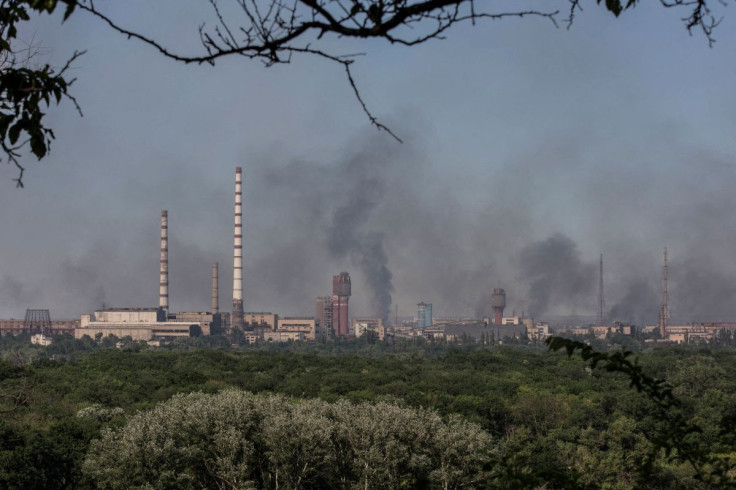Ukraine Ignores Sievierodonetsk Ultimatum, Urges Faster Arms Deliveries

Ukraine ignored a Russian ultimatum to surrender the eastern city of Sievierodonetsk on Wednesday as the United States announced more weapons for Kyiv, which warned that arms deliveries were taking too long.
Sievierodonetsk, now largely in ruins, has become the focal point of the war. Russia had told Ukrainian forces holed up in a chemical plant there to lay down their arms from Wednesday morning as it fights for control of eastern Ukraine.
Ukraine says more than 500 civilians, including 40 children, remain alongside soldiers inside the Azot chemical factory, sheltering from weeks of Russian bombardment. Russian-backed separatists in the area say up to 1,200 civilians may be inside.
The mayor of Sievierodonetsk, Oleksandr Stryuk, said Russian forces were trying to storm the city from several directions but the Ukrainians continued to defend it and were not totally cut off, even though all its river bridges had been destroyed.
"The situation is difficult but stable," he told Ukrainian television. "The escape routes are dangerous, but there are some." He made no reference to Russia's ultimatum.
Moscow said it had opened a humanitarian corridor from Azot on Wednesday to allow civilians to escape to Russian-controlled territory. It accused Ukraine's forces of disrupting that plan and using civilians as human shields, which Kyiv denies.
"There are no obstacles for civilians to leave... except for the decision in principle by the Kyiv authorities themselves," Russia's defence ministry said in a statement. Reuters was unable to verify that claim.
Serhiy Gaidai, governor of the Luhansk region containing Sievierodonetsk, said Ukraine's army was defending the city and trying to stop Russian forces from taking its twin city Lysychansk on the opposite bank of the Siverskyi Donets river.
Reuters could not immediately verify the battlefield accounts.
Luhansk is one of two eastern provinces Moscow claims on behalf of separatist proxies. Together they make up the Donbas, an industrial region where Russia has focused its assault after failing to take Ukraine's capital Kyiv in March.
'PIVOTAL MOMENT'
Addressing dozens of NATO defence ministers meeting in Brussels to debate their next moves, U.S. Defense Secretary Lloyd Austin said the invasion was at a pivotal moment.
"We can't afford to let up and we can't lose steam. The stakes are too high," he said at the start of the talks.
NATO Secretary General Jens Stoltenberg said the alliance was "extremely focused on stepping up support" for Ukraine.
U.S. President Joe Biden later announced $1 billion worth of new weapons aid for Ukraine that includes anti-ship rocket systems, artillery rockets and rounds for howitzers.
Biden, who spoke with Ukraine's President Volodymyr Zelenskiy by phone on Wednesday, also announced an additional $225 million in humanitarian aid to Ukraine.
Kyiv is pleading for faster and more frequent deliveries of weapons as Russian President Vladimir Putin seeks full control of the Donbas and a swathe of southern Ukraine.
Ukrainian soldiers in the south are fighting to retake ground in wheat fields and empty villages northwest of Kherson, a Russian-occupied city that straddles tributaries to the Black Sea.
Officials there told Reuters that recent deliveries of M777 Howitzers from the United States have been too few and that Ukraine remains numerically outgunned.
"I know we have it. I've seen how it works. But there's not a lot of it working yet," an engineer manning a Soviet-designed artillery piece hidden under a bridge said of the new Western equipment.
'BRUSSELS, WE ARE WAITING'
Western nations have promised Ukraine NATO-standard weapons but deploying them is taking time. Zelenskiy said there was no justification for delays.
His adviser, Mykhailo Podolyak, said the defenders of Sievierodonetsk wanted to know when the weapons would arrive. "Brussels, we are waiting for a decision," he wrote on Twitter.
Western countries are aware of the limitations of their weapons delivery but are determined to provide enough to force Russia to the negotiating table, Ukrainian presidential adviser Oleksiy Arestovych said.
"They see they are giving us 100 howitzers and the Russians bring 600 from storage," he said. "It looks like the race is going to be longer and more onerous than they planned for."
The conflict has sent grain prices soaring, while Western sanctions against Russia have driven up oil prices.
Ukraine's agriculture minister told Reuters the invasion would create a global wheat shortage for at least three seasons by keeping much of the Ukrainian crop from markets.
Russia said it had offered "safe passage" for Ukraine grain shipments from the country's Black Sea ports but said it was not responsible for establishing such corridors.
© Copyright Thomson Reuters 2024. All rights reserved.







